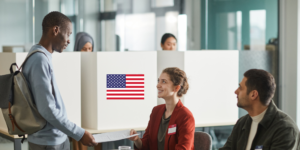
Listen to this note:
The electoral process in the United States has begun, and the participation of the single vote in the United States is essential, however, many think that their community is not represented and that their vote makes no difference, so people and organizations seek to inform and involve the community to help generate changes.
Engaging black communities and people of color in primary and general elections can be a difficult task, as voters of color, including Latinos, African Americans and Asian Americans, are less consistent voters than whites on electoral issues because they do not feel a sense of belonging in the process.
